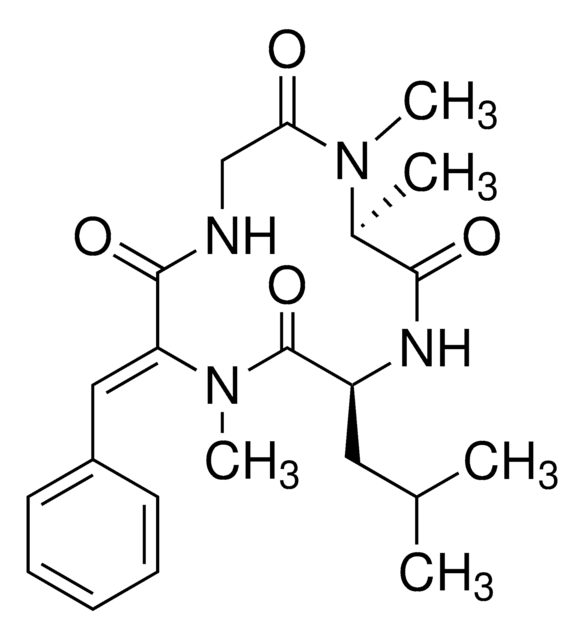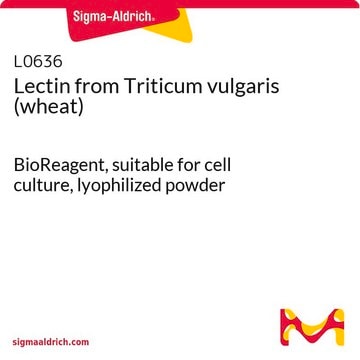Functionally, WGA1 and WGA2 kits are identical. The only difference between the two kits is that WGA2 is supplied with the WGA polymerase.
WGA1
GenomePlex® Whole Genome Amplification (WGA) Kit
Kit for whole genome amplification from a variety of DNA sources including FFPE tissue
About This Item
Productos recomendados
Nivel de calidad
técnicas
whole genome amplification: suitable
Condiciones de envío
wet ice
temp. de almacenamiento
−20°C
Descripción general
WGA Kit utilizes a proprietary technology based on random fragmentation of genomic DNA and conversion of the resulting small fragments to PCR-amplifiable library molecules flanked by universal priming sites. WGA is achieved by PCR amplification of the library molecules using universal oligonucleotide primers.
GenomePlex method allows the researcher to generate a representative, ~500-fold amplification of genomic DNA. The amplification yield is dependent on the purity and amount of starting material. This kit contains all the required reagents to perform library preparation and fragmentation.
Aplicación
Características y beneficios
- Higher yield from minimal template: Amplification of nanogram amounts (10ng) of genomic DNA to microgram yields (5-10 μg) in less than about three hours
- Nanograms of samples can be preserved at –20 °C for future use
- Choose from a variety of DNA sources: whole blood, buccal swab, blood card, plant, soil, and formalin-fixed paraffin-embedded tissue (FFPE)
- Compatible with a wide variety of downstream applications such as TaqMan® and BeadArray assays
- Universal primers
- Whole-genome representation with no detectable bias
- Increased accuracy in amplification produces no amplicon in the negative control reactions
Otras notas
Información legal
Los componentes del kit también están disponibles por separado
- W4502Water, Nuclease-Free Water, for Molecular BiologySDS
Opcional
Producto relacionado
Código de clase de almacenamiento
10 - Combustible liquids
Clase de riesgo para el agua (WGK)
WGK 3
Punto de inflamabilidad (°F)
Not applicable
Punto de inflamabilidad (°C)
Not applicable
Elija entre una de las versiones más recientes:
¿Ya tiene este producto?
Encuentre la documentación para los productos que ha comprado recientemente en la Biblioteca de documentos.
Los clientes también vieron
Artículos
Whole genome amplification overcomes restrictions for single-cell genomic analyses with non-specific amplification.
Protocolos
Archived Formalin-fixed, Paraffin-embedded (FFPE) tissue samples are invaluable resources for profiling gene expression and studying a variety of diseases.
Archived Formalin-fixed, Paraffin-embedded (FFPE) tissue samples are invaluable resources for profiling gene expression and studying a variety of diseases.
Archived Formalin-fixed, Paraffin-embedded (FFPE) tissue samples are invaluable resources for profiling gene expression and studying a variety of diseases.
Archived Formalin-fixed, Paraffin-embedded (FFPE) tissue samples are invaluable resources for profiling gene expression and studying a variety of diseases.
-
What is the major difference between WGA1 and WGA2 kits?
1 answer-
Helpful?
-
-
Can I use WGA1, GenomePlex® Amplification Kit to amplify DNA from a single cell?
1 answer-
Using this kit to amplify DNA from a single cell is not recommended. We recommend using the GenomePlex Single Cell WGA Kit (WGA4) for such application. WGA4 was developed for use with single cells and includes an optimized cell lysis protocol which has been incorporated into the fragmentation step.
Helpful?
-
-
If starting with fragmented DNA, what is the smallest size fragment which can be successfully amplified with WGA1, GenomePlex® Amplification Kit, and do I still need to do the fragmentation step?
1 answer-
The kit works best for fragments 400 bp and larger. When starting with fragmented DNA, we recommend: (1) skipping the fragmentation heat step, although the buffer should be added, and (2) increasing the PCR cycles from 14 to 20.
Helpful?
-
-
Can I amplify single stranded DNA with Product WGA, GenomePlex® Amplification Kit?
1 answer-
When starting with single stranded starting materials, we recommend (1) skipping the fragmentation heat step, although the buffer should be added and (2) increasing the PCR cycles from 14 to 20. Note that if the ssDNA is actually cDNA from polyadenylated RNA, the kit will likely not give good representation of the input material, as the poly(T) ends constitute a large, non-random fraction.
Helpful?
-
-
What is the major difference between WGA1 and WGA2?
1 answer-
Functionally WGA1 and WGA2 are identical. The only difference between the two kits is that WGA2 is supplied with the WGA polymerase.
Helpful?
-
-
What is the Department of Transportation shipping information for this product?
1 answer-
Transportation information can be found in Section 14 of the product's (M)SDS.To access the shipping information for this material, use the link on the product detail page for the product.
Helpful?
-
-
Is the WGA1 GenomePlex® Amplicification Kit polymerase compatible with TA cloning?
1 answer-
WGA polymerase is compatible with TA cloning with the following alteration to the PCR step: Be sure to include a 7 to 30 minute extension at 72°C after the last cycle to ensure that all PCR products are full length and 3´ adenylated.
Helpful?
-
Active Filters
Nuestro equipo de científicos tiene experiencia en todas las áreas de investigación: Ciencias de la vida, Ciencia de los materiales, Síntesis química, Cromatografía, Analítica y muchas otras.
Póngase en contacto con el Servicio técnico















